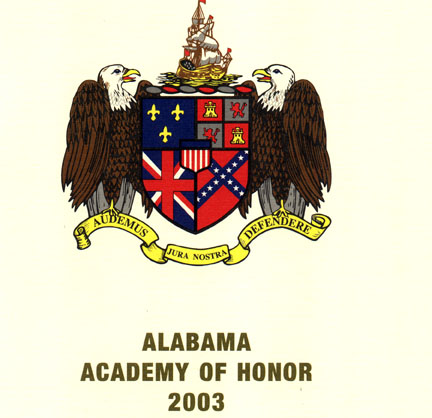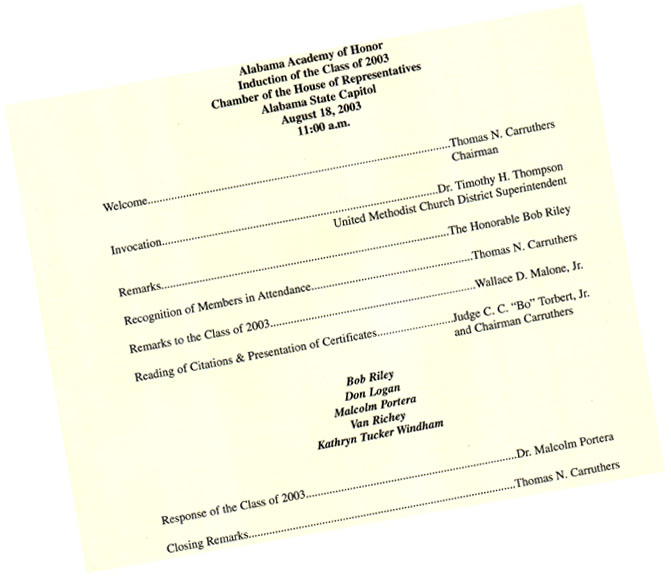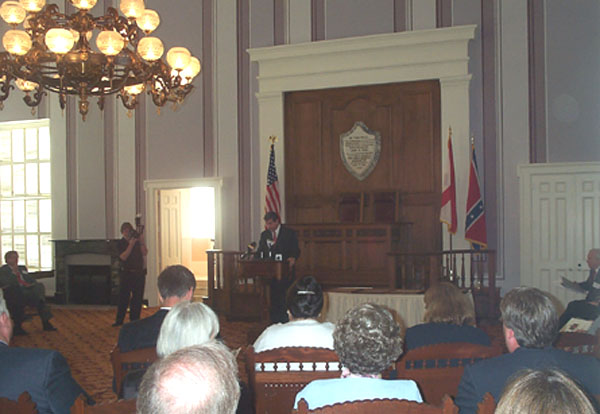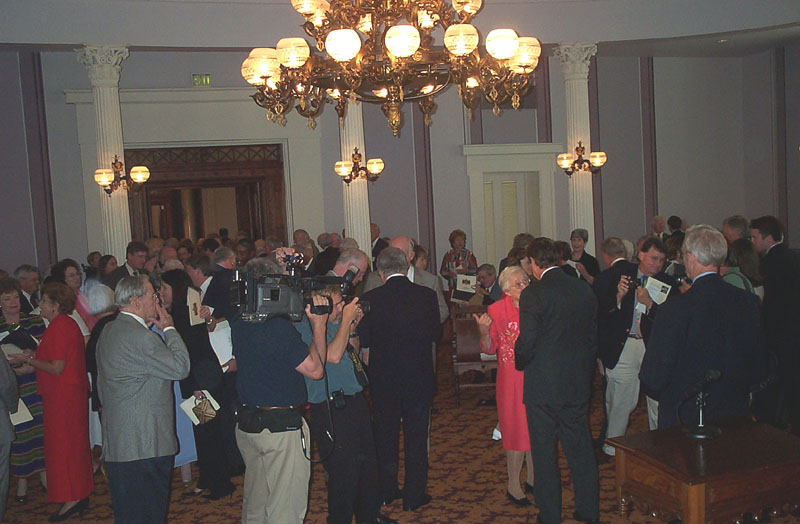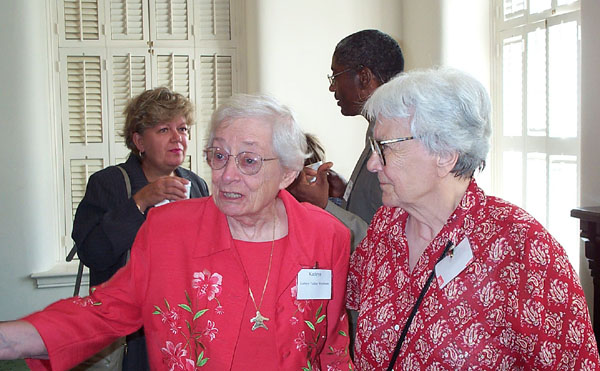
Two Alabama authors: Kathryn Tucker Windham of Selma and
Nelle Harper Lee of Monroeville.
In background is Mrs. Windham's daughter, Helen Ann (Dilcy) Hilley of
Birmingham
and Alabama folk artist Charlie Lucas of Selma. Miss Lee is a
past Alabama
Academy of Honor inductee.
Montgomery
Advertiser
Aug. 19, 2003
AL BENN'S ALABAMA
State's best lauded
By Al Benn
When George Wallace was
running for governor and president -- often at the
same time -- he liked to say
at rallies that Alabamians were "as refined
and cultured" as anyone in the
country.
He also enjoyed calling those
of us who covered his campaigns
"pointy-headed" pencil pushers
with preconceived, jaundiced views of
Alabama.
Wallace knew he was playing to
the crowds that turned out for his campaign
speeches, but he also was
aware that his comments contained more than a
kernel of truth.
Monday's induction ceremony at
the annual Alabama Academy of Honor
reflected Wallace's belief
that his state has produced some of America's
most important citizens.
The newest inductees are:
(1) Gov. Bob Riley: A
successful businessman who served three terms in
Congress before being elected
to Alabama's most important position last
year.
(2) Don Logan: As chairman of
AOL Time Warner's Media and Communications
Group, he oversees one of the
world's largest print and electronic
operations.
(3) Malcolm Portera: As
chancellor of the University of Alabama System, he
supervises the state's largest
higher education enterprise with a $2
billion budget, 42,000
students and 21,900 employees.
(4) Van Richey: President and
chief executive officer of American Cast
Iron Pipe Co., he guides a
business that has been named by Fortune
magazine as one of the 100
best companies to work for in America.
(5) Kathryn Tucker Windham:
She has established herself as a nationally
known storyteller, author,
radio personality and photographer.
The five joined an illustrious
group of Alabamians who preceded them in
induction ceremonies dating
back to the academy's inception in 1965.
Many of those honored in the
past were on hand to welcome the newest
group. Among them was Nelle
Harper Lee, famed author of "To Kill A
Mockingbird." She watched
quietly from the balcony.
"This is an academy of
achievers, deep thinkers and dreamers" said
Portera, who spoke for the
newest group of inductees.
Riley, who flew in from
Mobile, was a few minutes late and he hurried into
the big room at the Capitol to
rousing applause as he slipped into his
jacket.
The governor spoke for a few
minutes about his favorite subject -- moving
Alabama forward. His comments
echoed what he's been saying on the tax
reform stump over the past few
weeks, but he didn't dwell on that.
"You are the best of Alabama,"
he told current and past inductees.
My Yankee relatives and
friends have, at times, taken a dim view of
Alabama, and I try my best to
set them straight. It hasn't been that
difficult, not with the likes
of those who are members of the Academy of
Honor.
Lee is one of the world's most
celebrated authors. Wernher von Braun and
his team of scientists
developed the rocket that put Americans on the
moon. Paul Bryant led the
University of Alabama back to gridiron
greatness. Thomas Moorer once
was chairman of the Joint Chiefs of Staff.
Condoleezza Rice is one of our
president's most trusted advisers.
Add to those achievers dozens
of industrialists, businessmen, jurists,
journalists and political
leaders and it's quite a lineup of excellence --
one that should make all
Alabamians proud.
------------------------------------------------------------------------
Alvin Benn writes a column for
the Montgomery Advertiser. If you have a
column idea, write, or call
his home, (334) 875-3249.
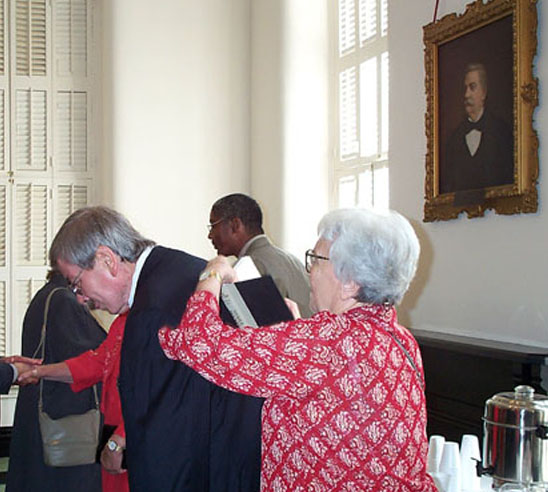
Nelle Harper Lee signs copy of her book, "To Kill a
Mockingbird" for Ben Windham,
Editorial editor of The Tuscaloosa News, and son of Kathryn Tucker
Windham.
BEN WINDHAM: An
encounter with Harper Lee
The Tuscaloosa News
Aug. 24, 2003
There was interesting news in the telephone call from Selma. My mother,
author-storyteller-photographer Kathryn Tucker Windham, would be
inducted in a few days into the Alabama Academy of Honor.
The Legislature created the academy in 1965 to honor the 100 greatest
living Alabamians. Needless to say, I was one proud son.
I’d known for some time that my mother had been selected. The news was
that Harper Lee, who nominated my mother, might attend the ceremony in
the old House chambers in Montgomery.
A public appearance by Harper Lee anywhere is news.
Her 1960 novel “To Kill a Mockingbird" is one of the most widely read
books on the planet, selling more than 30 million copies in English and
translations in three dozen languages.
It won the Pulitzer Prize and was made into a classic movie, starring
Gregory Peck in the role of a lifetime.
But for all of the stunning success of her book, Lee, who turned 77 in
April, has kept a low profile. Some people call her a recluse; others
say she simply enjoys her privacy, sharing her life with a small circle
of family and friends.
In the Alabama vernacular, she likes to keep her business down home.
She has not granted an interview since 1964. Except for one event in
the 1980s, she has not spoken in public for years.
According to reports, she divides her time between her small south
Alabama hometown, Monroeville, and New York City, where she walks the
streets happily incognito, dressed down like a native.
Even in Monroeville she seems to begrudge her celebrity. She has never
attended a local performance of the play adapted from her novel in
which townspeople portray the characters. Years ago she stopped signing
her books for Monroeville stores when she learned the prices were being
jacked up by merchants and customers alike.
She sticks tightly to a small circle of family and friends. Wary of
fans and reporters, she does not enjoy being photographed.
As soon as I heard she might be in Montgomery last Monday for the
Academy of Honor induction, I called my younger sister.
“How gauche would it be if I took a copy of 'To Kill a
Mockingbird’ for her to autograph?" I asked.
My sister didn’t answer quickly. It would be our mother’s day to shine,
after all.
“Well," she said finally, “I don’t think it would be too tacky. I have
an autographed copy. I think you should have one, too."
The answer didn’t sound all that convincing.
“OK," I said. “I don’t really want to bother Miss Lee. I’ll think about
it."
I thought until last Saturday, when I decided to go ahead and be
gauche. I’d read that Lee is polite, but a friend also said she has
“hell and pepper in her." I figured if she didn’t want to sign, she
would say so.
The only problem was, I couldn’t lay hands on my copy of her famous
book.
We recently introduced a massive new entertainment center into the
great room of our house, displacing novels, records, tapes and
electronic gear. We haven’t quite gotten things straightened out yet,
and books, towering in precarious piles, still clog the area around the
coffee table.
Searching for “Mockingbird," I waded into the thick of this literary
logjam, pulling out volumes I hadn’t seen in years: a biography of John
Lee Hooker, a collection of Chekhov’s works, Archibald Rutledge’s
wonderfully anachronistic portrait of a vanished South, “God’s
Children."
But Lee’s masterpiece remained as elusive as its author.
Then I remembered. I had loaned it to my son, who had the book on his
ninth-grade reading list last year.
“Oh yeah," he said when I pressed the issue. “I think I still have it
... somewhere."
Again, it was not a reassuring answer. By early Sunday afternoon the
book still hadn’t turned up.
Only 20 hours remained until the Academy of Honor induction. I prepared
to head out for one of Tuscaloosa’s two bookstores that do business on
Sunday.
I was tying my shoes when he burst in triumphantly.
“Found it, Dad!"
And so he had ó or most of it. The dust jacket was missing, and
the cover bore scars of public school classrooms. Inside the front
cover, in large block letters, he had written his name with a black
Magic Marker.
It was not the kind of thing to present to an eminent author. I decided
to look for a more presentable copy.
I couldn’t find one. The stores had paperback copies of “To Kill a
Mockingbird," but if I wanted a hardbound copy, it would be a special
order.
That wasn’t an option, and presenting a paperback for Lee’s inscription
offended even my sense of decorum.
Deflated, I decided to forget about seeking an autograph and just enjoy
the ceremony with my family.
It was only at the last moment ó as I headed out the door early
Monday for Montgomery ó that I decided to grab the old hardback
copy anyway. Just in case.
I met up with my younger sister at her home in Birmingham.
“What do you think?" I asked, showing her the scarred, jacketless,
written-in book.
“I think it’s fine," she said. “Look what I’m taking."
It was a huge poster for the movie of “To Kill a Mockingbird."
Apparently it had been collected from some Spanish-language cinema. A
portrait of Gregory Peck as Atticus Finch dominated the poster, under a
banner that read “Para Matar un Sinsonte."
“The English-language posters for ëTo Kill a Mockingbird’ are
pretty hot," my sister explained. A friend had given her the more
easily available Spanish one.
I didn’t feel nearly so awkward then.
Privately, I doubted that Lee would give either of us an autograph, but
I had pretty much convinced myself that it didn’t really matter. It
would be much more interesting, I thought, if we could talk to Lee
about her life and literary career.
What little I knew about her current activities I gleaned from an
article by a writer named Marja Mills that was published last September
in the Chicago Tribune. Lee wouldn’t be interviewed, but Mills managed
to talk to her sister, some of her friends, a Monroeville minister and
others to put together an interesting portrait.
It said, among other things, that Lee is a Republican, a conservative
on some issues and liberal on others. One of her friends said she is
frustrated that the world has grown “coarse and obscene" and that the
South has failed to come to grips with racism.
Why she has never published another book is a question that has
fascinated her fans and critics for years. Alice Finch Lee explained to
Mills that her sister had simply “hit the pinnacle" with her first
novel and there was no need to try to top it.
I’ve heard alternate explanations. Years ago, I met Archulus Persons,
Truman Capote’s father (Capote took the surname of his Cuban stepfather
after his mother remarried). By blood, Truman was related to the
Alabama family that includes Gordon Persons, the governor who brought
Coach Ralph “Shug" Jordan to Auburn and martial law to Phenix City when
Attorney General-elect Albert Patterson was murdered.
Arch Persons didn’t say so, but he and his wife weren’t very good
parents during their troubled marriage. Truman was reared mostly by
female relatives in Monroeville. Their house happened to be next to
Harper Lee’s; Lee and Capote grew up together and remained firm friends.
What Persons did tell me was that Capote wrote “almost all" of “To Kill
a Mockingbird."
I don’t believe it, especially coming from Persons, who struck me as a
blowhard. Moreover, Lee’s sister adamantly denied the same allegation
in the Chicago Tribune piece, calling it “the biggest lie ever told."
Perhaps Capote helped here and there with her novel, just as Lee helped
him during his research for “In Cold Blood." But I believe “To Kill a
Mockingbird" is very much Lee’s own work. The similarities to Capote’s
own pieces set in Alabama are no more than one would expect from great
artists who shared a childhood together, talking about people, ideas
and stories.
I figured Lee would never talk to me about Capote, but I figured there
would be plenty of other things to discuss.
We share a lot of mutual interests. She is a devoted follower of
Alabama football. Like me, she had a father whose given name was Amasa.
She enjoys fishing, local history and down-home foods. Eudora Welty,
Mark Twain and William Faulkner are among our favorite writers.
My sister and I got to Montgomery in time for a reception before the
induction ceremony. I gave my mother a kiss and a bear hug. Then I
couldn’t help myself. I asked her if Harper Lee had come.
“She’s right there," my mother said, gesturing toward a coffee table
near a corner.
I couldn’t have picked her out. She was short, gray-haired,
bespectacled and smiling. She wore a blouse with pleasing patterns of
crimson and white.
Furthermore, she didn’t shy away when I asked for an autograph ó
for my son, I explained, proffering the battered book. She graciously
agreed at once.
There was no room on the coffee table, so she suggested using my back
as a substitute. I stooped over, she placed the book firmly between my
shoulder blades and signed it.
I pressed my luck. “May I have a photo of you and my mother?" I asked.
Again, she readily agreed. As I aimed in their direction and fumbled
with the digital knobs, a swarm of other cameras erupted from nearby
coats and bags and flashes fired off from every direction. Lee did not
seem particularly pleased.
Realizing that it was not a good time to try to start a conversation, I
thanked her and wandered off with my book to find my sister.
She stared at the inscription.
“Oh, I hate you," she said. “Do you think she’ll sign my poster now?"
“Only one way to find out," I replied.
Again, Lee agreed. But her patience clearly had worn thin. A friend
trying to photograph her in the act of autographing the poster got a
waggling finger signifying “no" from the author.
It was at that point that my old friend and colleague Alvin Benn, now
retired as a reporter from the Montgomery Advertiser, cruised up.
Al is no shrinking daisy and he doesn’t live life in kid gloves. You
know when Al’s in the house.
“Harper Lee!" he exclaimed.
Evidently they’d crossed paths before.
“You’re retired," she said, heading out of the reception room. Then she
added with a smile, “You bastard."
Their exchange was loud enough for everyone to hear but Al took it in
stride. Laughing, he said he might use Lee’s comment on the dust jacket
of a book he’s writing about his life and times in the news business.
My mouth was open. I decided the hell and pepper had temporarily taken
precedence over the part that finds the world crude and obscene.
Al saw it as kind of an affectionate salute.
“Besides," he told me later, “it’s not every day that a world-famous
author calls you a bastard."
Soon we were summoned to the induction ceremony in the old House
chambers.
Unlike other members of the academy, who took their seats on the floor
in comfortable antique chairs, Lee sat in the balcony, where the press
corps had covered the lower chamber when the old Capitol was still used
by the Legislature.
Afterward, she attended a luncheon for the honorees but she was seated
at another table, in a decidedly inconspicuous position against the
wall.
Our table was slow to leave. People kept dropping by to talk to my
mother. By the time I looked around, Lee was gone.
Still, it hadn’t been a bad day. I was full of pride for my mother’s
honor. And I could one-up Alvin Benn. How many people can say they had
a great American author autograph a classic book squarely between their
shoulder blades?
The next day, a friend e-mailed me a photo he snapped of Lee using my
back as a writing desk. But “don’t forward it to anybody," he warned in
the e-mail. “I don’t think Miss Lee likes that kind of thing."
Don’t worry, cuz. I’ll keep it down home.
Reach Editorial Editor Ben Windham at (205) 722-0193 or by e-mail at
ben.windham@tuscaloosanews.com
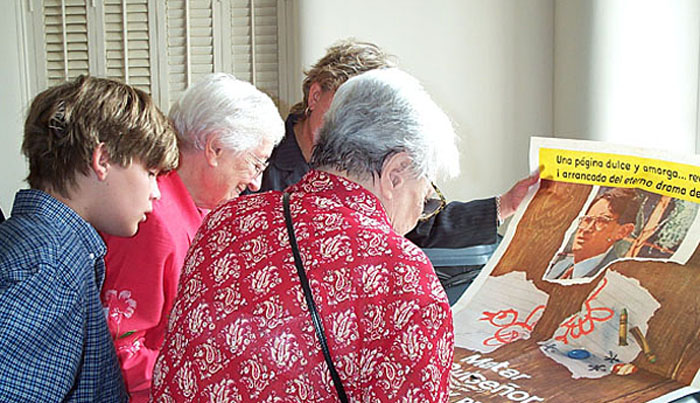
Harper Lee signs movie poster for Dilcy Windham Hilley.
Looking on are Kathryn Windham's grandson,
Ben Hilley, a seventh grader at Pizitz Middle School in Birmingham;
Kathryn Windham; and Dilcy Windham Hilley.
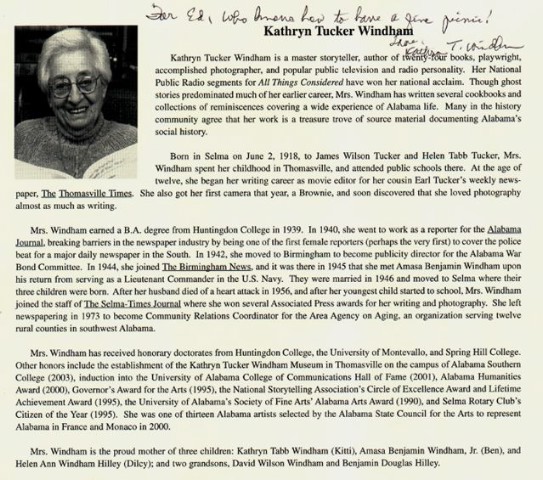
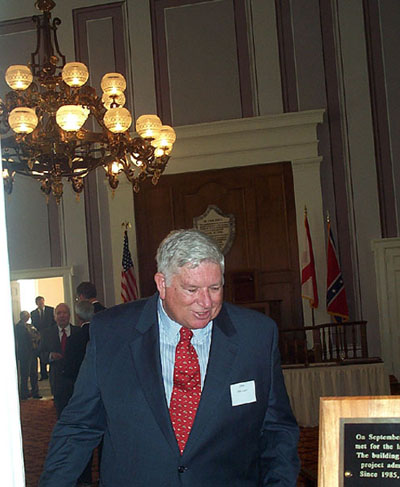
Alabama Academy of Honor inductee Don Logan,
chairman of Time Warner's Media and Communications Group.
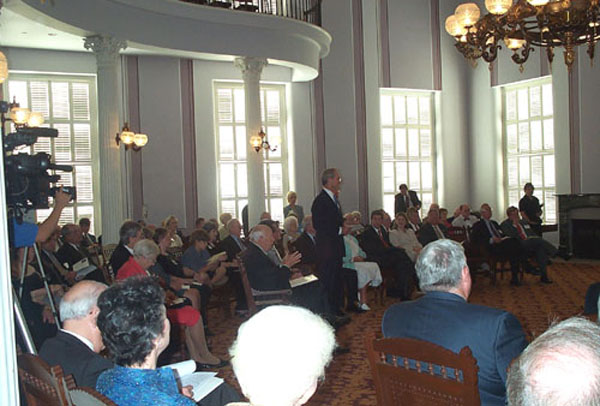
Past Alabama Academy of Honor inductee is former Gov. Don
Siegelman.
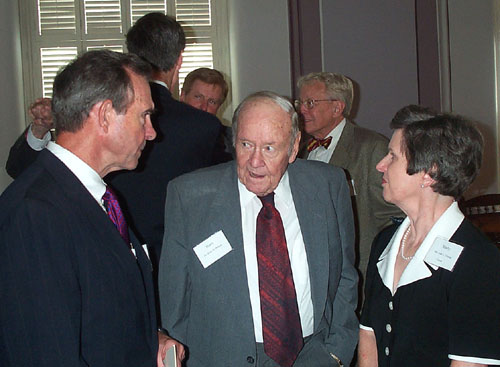
Past inductees, from left, are former University of Alabama president
Dr. Joab Thomas and former Auburn University president Dr. Harry
Philpott,
and Mrs. Thomas.
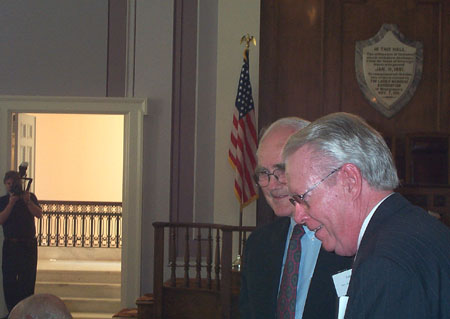
Past inductee is former Gov. John Patterson, left.
Patterson chats with former Secretary of State Jim Bennett
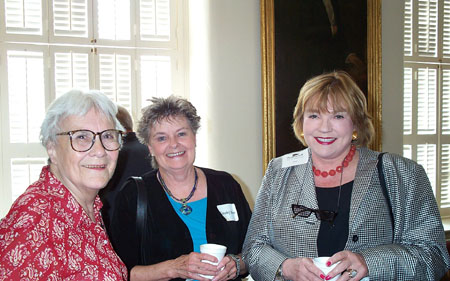
From left: Nelle Harper Lee and Dot Stewart, both of
Monroeville,
and Josey Ayers, The Anniston Star, Anniston, Ala.
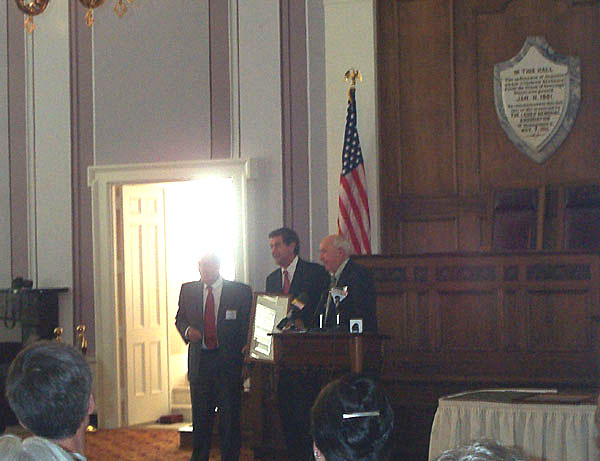
Gov. Bob Riley is inducted to Alabama Academy of Honor. Looking
on are Thomas N. Carruthers
and Judge C.C. "Bo" Torbert Jr.
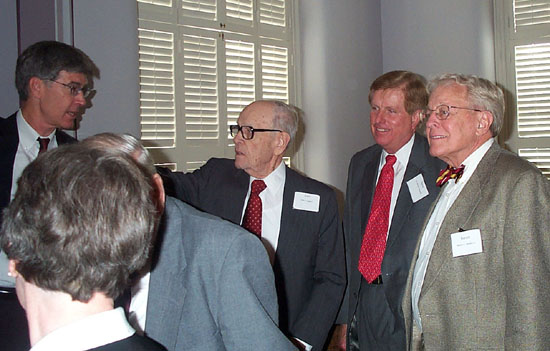
State Archivist Ed Bridges, Administrative Liaison for the Alabama
Department of
Archives and History; past academy inductee Dr. David G. Bronner of the
State
Retirement Systems; and Barrett C. Shelton Jr. a past inductee, and
publisher of
The Decatur Daily in Decatur, Ala.
A walk through the Capitol and grounds
after the Academy of Honor ceremony...
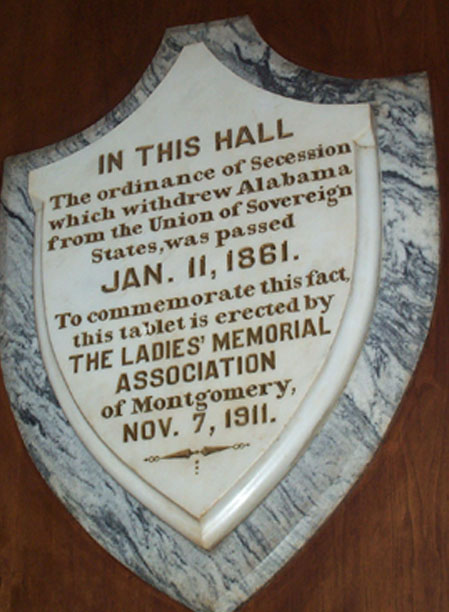
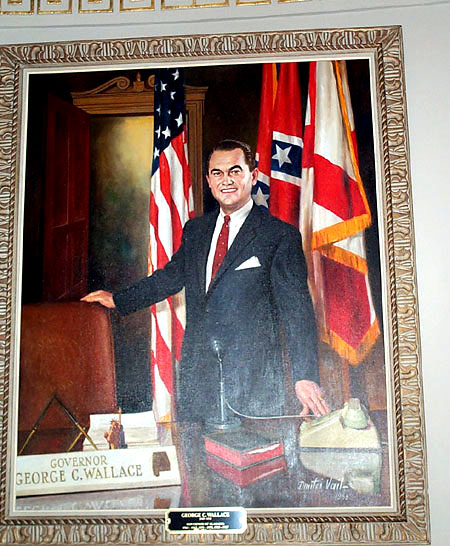
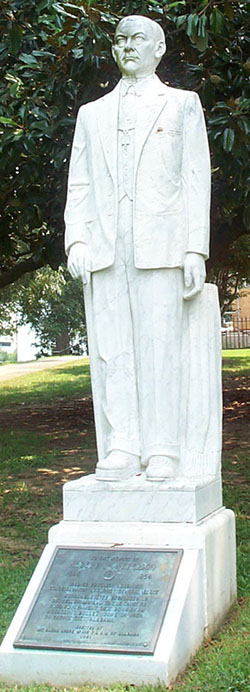
Statue of former Gov.
Albert Patterson.
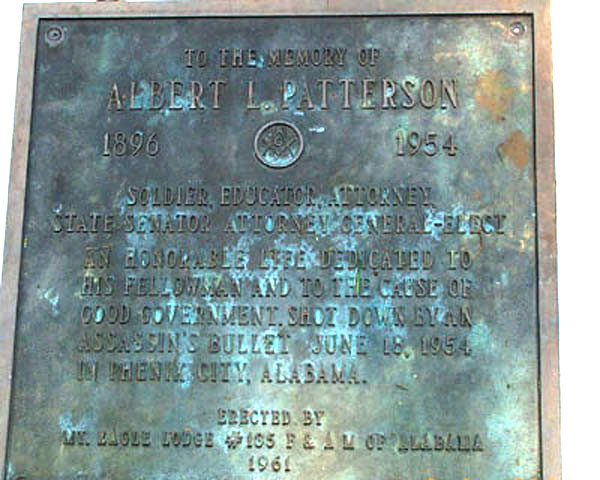
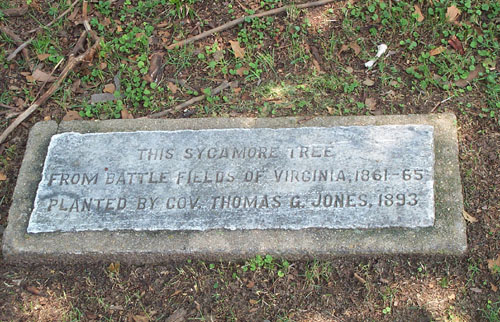

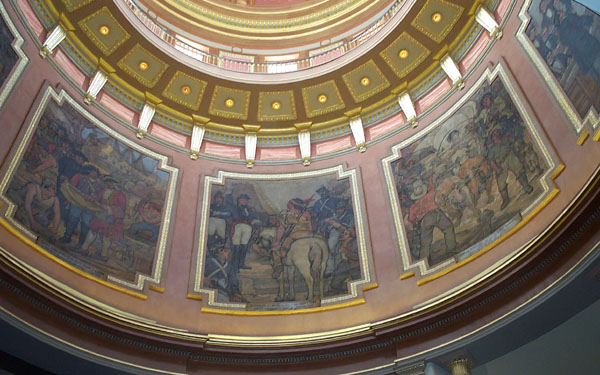

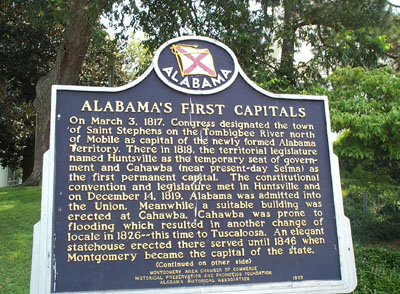
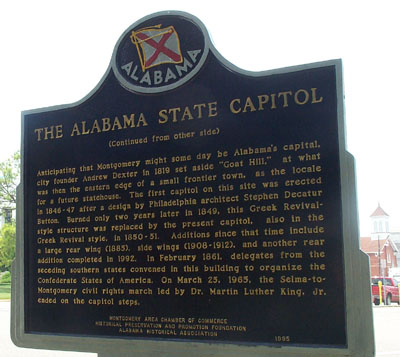
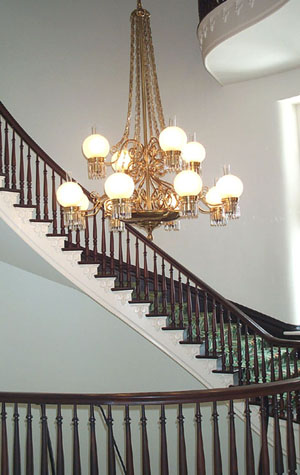
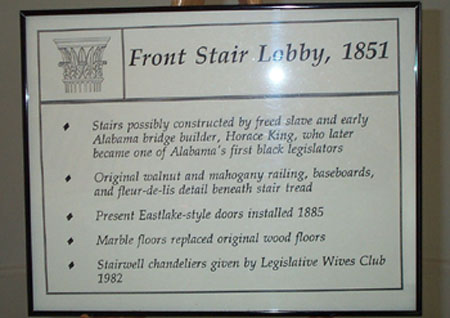
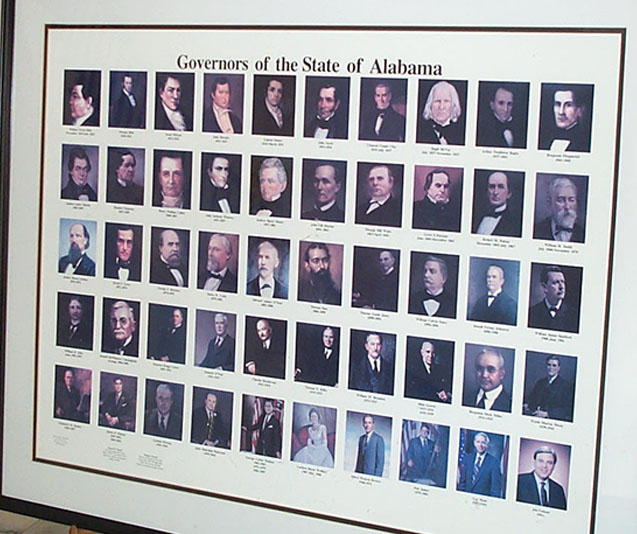
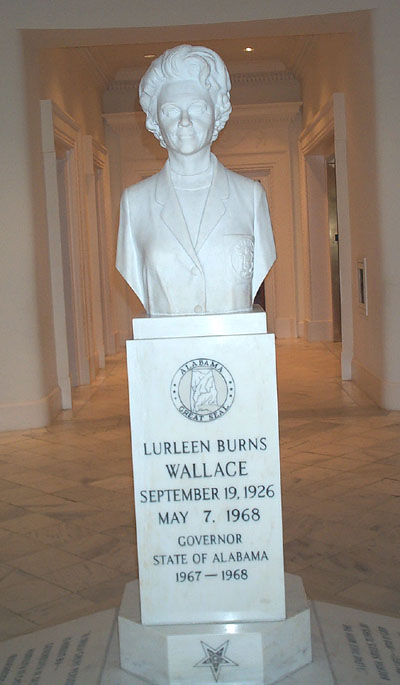
Finally, the best part ...
Lunch
at Chris' Hot Dog Stand, Dexter Avenue
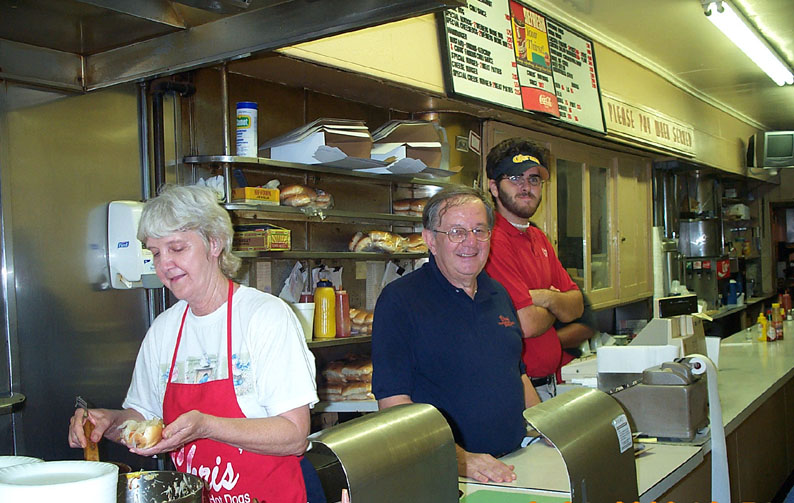
Joyce Bodiford prepares one of Chris' famous hot dogs "all the
way," while owner Theo Katechis looks on.
Behind Katechis is employee Greg Cumuze.
Odd-Egg Editor
By Kathryn Tucker Windham
This eye-opening memoir by a
far-minded and engaging writer recalls what life was like for a female
reporter in that unbudging male bastion, the southern newsroom.
Chapter 3
Recollections of Chris’s Hot Dog
Stand
Dexter Avenue
Montgomery, Alabama
In the days before Pearl Harbor
I was still covering the police beat, still leaving with Mr. And Mrs.
Allen Woodall and their two little boys, Sonny and Buddy, at 28
Cloverdale Park (I paid forty dollars a month for a room with private
bath, maid service and two meals a day), and still being paid fifteen
dollars a week. I was making small weekly payments on a Schwinn
bicycle and an Underwood portable typewriter. They,
and a few books, constituted my worldly possessions.
My recreation budget would have
been extremely limited and I likely would have been broke most of the
time had it not been for my radio movie reviews and the “lamp shade
circuit.”
Allen Woodall, who was
advertising manager for Radio Station WSFA, arranged for me to get
passes to aall the movie theatres in exchange for doing brief weekly
reviews for the station. The experience I had had writing movie
reviews for my cousin Earl’s weekly paper, back when I was in high
school in Thomasville, stood me in good stead.
For the “lamb shade
circuit,” I wrote fluffy articles about small local businesses, such as
specialty shops, tearooms, home furnishings and interior
decorating establishments (hence the name “lamp shade circuit”) and
others. The articles were used on the business review page of the
paper, and I was paid $7.50 weekly for my contributions. This
work was separate and distinct from my job as a reporter and was dune
during my off hours.
Even with my augmented income, I
might have gone hungry at noon occasionally if it had not for for
Chris’s hot dog stand. Chris’s place was on Dexter Avenue,
convenient to the newspaper office, and until the war with its blackout
regulations came along, his big neon sign “Famous Hot Dogs”
illumined the area at night. I patronized Chris’s nearly
every day. At the entrance were racks of cigarettes and candy,
often scarcely filled because of World War II rationing, and a soft
drink box.
Although I cannot now find
anyone who can verify it (as Mark Twin said, “I find that the further
back I go, the better I remember things, whether they happened or
not”), I recall that near the entrance was a device known as a
Pan-o-ram where customers could insrt a dime and see a talking
movie. The machine was a sort of glorified nickelodeon and was
owned or promoted by James Roosevelt, son of the president. It
obviously was never widely popular, and the advent of television marked
its doom.
A long counter with stools
extended down the left side of Chris’s place, and over on the right
side, behind a partition, was a long corridor with booths and small
tables along the walls. The stand was crowded with customers
(white only) during the lunch hour, and Chris seemed to be everywhere –
taking orders, serving food, running the cash register, checking on the
kitchen, greeting customers. “Yes, ma’m. Wudkinidufuhyse
today, ma’m? One hot dog? Two?
Bestindewholewol.” They were.
Chris’s hot dogs were juicy and
tender, served hot on a fresh bun with everything on them, including
his own secret Greek sauce. They cause eight cents each. He
had to sell a lot of hot dogs to support his wife and five children.
Chris, who had come over from
the old country, had a rounding stomach and a swarthy complexion that
made him look as if he needed a shave. He had a scattering
of gold teeth and his black eyes sparkled with friendliness. He
always cashed my check on payday. “Gotta check? How
much, ma’m? What? No grow! No grow! Sometimes I
felt that he lamented the smallness of my salary as much as I did.
Chris was intensely patriotic,
and after the way started, he was always eager for news.
When I walked in, his daily greeting was, “Watzewarnus?
Good? Bad? Wewwhipem yet?!”
After Pearl Harbor, Chris became
even more ardently patriotic. He invested in war bonds and urged
his patrons to do the same, he promoted scrap metal and aluminum
drives, and he displayed flags all over his hot dog stand.
When customers complained of shortages, Chris was prompt to
remind them, “Wegottawinwar!”
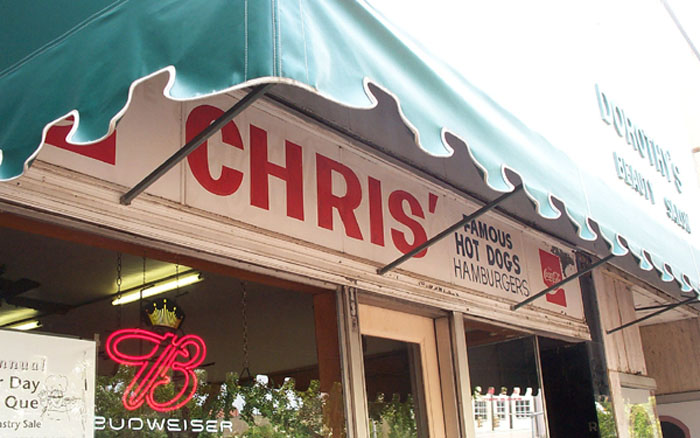

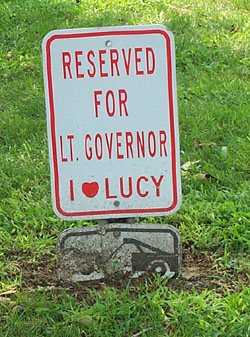
The end
Thanks for visiting my
Web
page!

Ed Williams
Auburn University
Auburn, Alabama
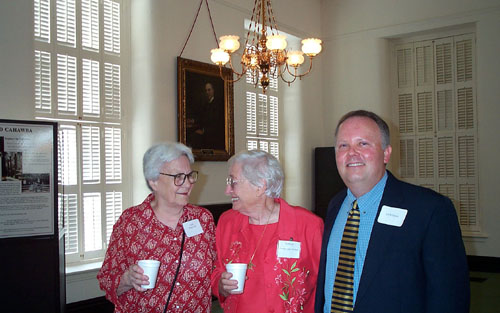
From left, Nelle Harper Lee, Kathryn Tucker Windham and Ed Williams

